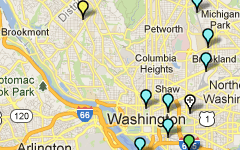Summary of Metro’s Recent Cost Efficiencies and Savings
Over the last five years, Metro has cut $200 million through efficiency-related reductions and achieved similar savings in costs avoided through management efficiency initiatives, restructurings, one-time savings and other actions, including:
MetroAccess: In FY11, by encouraging select paratransit riders to use fixed route transit, Metro saved more than $25 million in paratransit costs. Continuing to promote this travel training has lowered MetroAccess demand and has allowed Metro to avoid spending an additional $10 million in FY13 alone.
Energy Efficiencies: Metro’s bus fleet has improved its fuel economy by 27 percent over the last eight years, saving money on rising fuel costs. Meanwhile, Metro’s facilities are saving money as well – the new Shepherd Parkway facility is LEED-Silver certified – and the new escalators and elevators are realizing significant energy savings.
Parking Facilities: Metro saves $3.1 million each year as a result of automating its parking facilities.
Employee Health and Wellness: As a result of a health insurance benefits program audit, Metro has cut $3 million per year, and plans to continue on the wellness track by incentivizing healthy behavior and habits to help its employees, increase productivity and further reduce health insurance costs.
Overtime: An organization-wide review of overtime procedures and pay is paying dividends. Since the end of 2012, overtime is $3 million lower than the same period for each of the two preceding years.
Transaction Costs: Metro is encouraging more SmarTrip Card usage, and as a result has reduced the use of paper fare media from 20% of payments to 12%, saving $1 million per year. Metro has its eyes set on more savings by targeting a 5 percent paper fare card usage rate.
Identifying More Efficiencies: An independent efficiency analysis is underway to assist in identifying further opportunities to save money in administrative areas. Read more…


Recent Comments